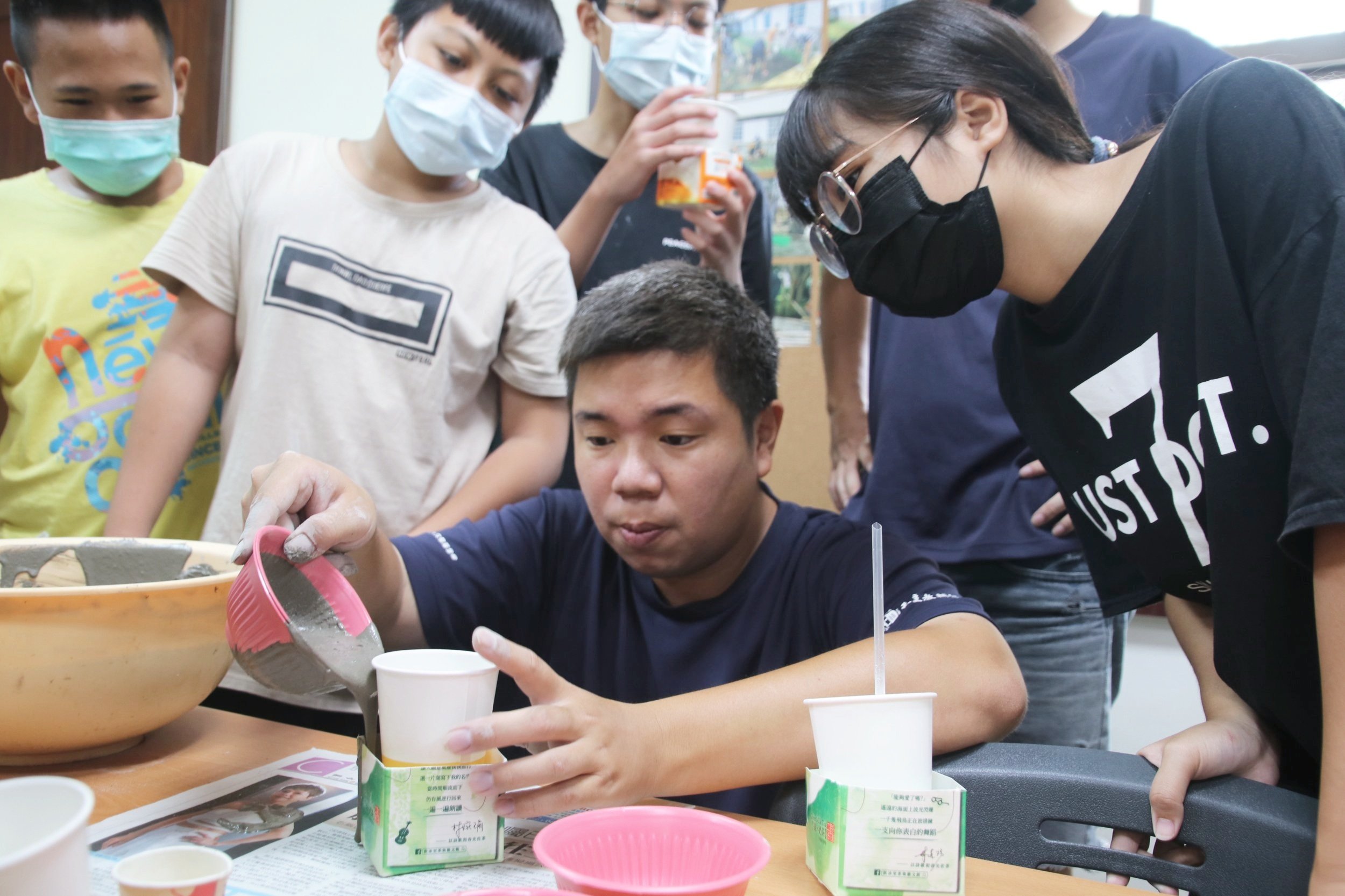Interview with Hsing-Cheng Fu, Rural Caring Center of Fu Jen Catholic University
Hsing-Cheng Fu was never a particularly studious child. After leaving the regular education system in high school, he entered a technical college. At that time, he never thought that education would be his calling, his life’s work, and that he would one day become a dedicated and enthusiastic educator.
Hsing-Cheng Fu feels that he owes it all to the teachers who believed in him and provided him attention and support. This is what motivates him to want to help others, to nurture their growth, and to work as an educator.
Hsing-Cheng may appear to be an ordinary college student, but he has worked in education counseling for over 10 years at the Rural Caring Center of Fu Jen Catholic University.
In addition to regularly assisting Fu Jen Catholic University and Mercy Home in promoting services for remote communities through online after-school programs, Hsing-Cheng also visits the children personally during summer and winter breaks to guide them on their learning journey.
Looking back on his own past, Hsing-Cheng feels that he owes it all to the teachers who believed in him and provided him attention and support. This is what motivates him to want to help others, to nurture their growth, and to work as an educator.
“I believe, rather than changing the environment, it is better to help the child to better face the environment that they’re in.” It is his empathy that drives him to better the lives of children living in remote areas.
Learning is letting children make mistakes
When conducting after-school programs for children in remote areas, Hsing-Cheng realized that in many cases, perhaps due to the child’s family dysfunction or lack of learning resources growing up, it takes time for both the educator and student to communicate and adjust to each other’s value system.
He believes that letting children make mistakes is also part of learning. Traditional educators tend to unilaterally "teach" or "remind" children orally, but he saw a different approach in Montessori philosophy.
Hsing-Cheng notices that “when children make mistakes, we should encourage them to understand the process, systematically guide children to break down steps, observe, and accompany them from the sidelines. In the end, the teacher has to learn to let go and return to their role as a guide.”
In 2021, Hsing-Cheng joined the Montessori Social Impact Talent Development Program and underwent AMI Montessori teacher training. Afterwards, by applying his training and past experiences, he developed a program and cultivated college students to participate in local community services.
Montessori philosophy highlights that the natural environment supports students’ development; therefore, “caring for the environment” is an important part of Montessori education.
For example, teaching an adolescent mop a floor is more than just telling them to do the chore. The teacher should guide the adolescents, show them how to hold a mop, how much water to use, how to put away the tools and in what order.
Each step is dissected so that the adolescent is motivated to use their own acquired skills to complete the task. How does a teacher help fulfill a child’s need for independence?
Hsing-Cheng confidently replies, "The Montessori teaching concept of 'learning by doing' and 'doing by learning' is not only suitable for children aged 6-12, but as long as we establish systematic learning in their minds, it will also have an unconscious influence on their future careers and lives after entering society!"
After undergoing the intensive curriculum of AMI Montessori teacher training, Hsing-Cheng realized that the difficulty for many educators is that there is no prescribed formula in applying Montessori theories, but that is exactly what makes the Montessori approach so interesting!
He embraces the ideal that as each child explores within a Montessori environment, they can find the path, which best suits their own learning.
This new outlook toward teaching inspired him to return to the remote areas of his childhood and to inspire youths and college students to join his efforts to teach in remote areas.
Each conversation is a lifeline
Hsing-Cheng Fu believes that as each child explores within a Montessori environment, they can find the path, which best suits their own learning.
Working to assist children in remote areas comes with a host of challenges, as many students come from troubled families or are unable or unwilling to attend school.
Those, who work in educational counseling, are mostly still enrolled in or are new graduates from college in urban areas. The difference between their backgrounds and that of the children they are seeking to help forms a nearly insurmountable obstacle.
If this gap is not bridged, the result is that the children feel alienated, and the counselors are left feeling frustrated. Hsing-Cheng’s advice to counselors in this dilemma is to take a step back and maintain a degree of flexibility in the situation rather than proceeding by the book.
He prefers to focus on the child and guide them through some kind of hands-on activity, whether that be gardening, woodwork, or doing math calculations, to uncover their intrinsic motivation for learning.
This allows both the student and educator to give and receive feedback, learn from one another, and build their confidence.
Hsing-Cheng’s participation in sponsored teacher training and his return to Taiwan to integrate Montessori principles with educational counseling for children in remote areas has inspired him to reset, reflect, and push forward on his quest.
He believes that with each guidance session, comes the opportunity to restore a child’s passion in learning, which can prevent them from giving up on themselves or to decide to turn to a life of organized crime.
In addition to working through existing agencies, Hsing-Cheng plans to establish an experimental education group to make Montessori affordable for everyone. It is this enthusiasm and dedication that has brought him to where he is today and empowers him to continue on his quest in the future.
Written by Angelina Chan
Images provided by Hsing-Cheng Fu
Translators: Robert Fox, Jen Hsu/Graduate Institute of Translation and Interpretation, NTNU














